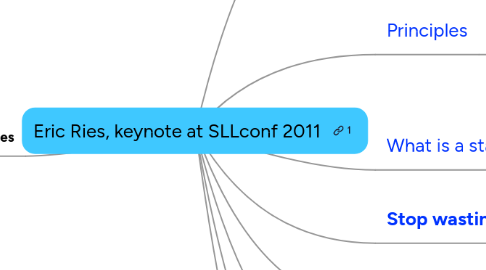
1. Slides
1.1. http://www.slideshare.net/startuplessonslearned/eric-ries-sllconf-keynote-state-of-the-lean-startup-movement
2. Lean startup movement
2.1. Academic programs
2.1.1. Harvard business school
2.1.2. Stanford Universiy
2.1.3. BYU
2.2. Books
2.2.1. The enterpreneur guide to customer development
2.2.2. The four steps to the Epiphany
2.2.2.1. Steven Blank
2.2.3. Running Lean
2.2.4. The Lean Startup / Eric Ries (coming soon)
2.2.4.1. http://lean.st
2.2.5. The Toyota Way
2.3. Lean movement fathers
2.3.1. Deming
2.3.1.1. "The customer is the most important part of the production line"
2.3.2. Ohno
3. Principles
3.1. Enterpreneurs are everywhere
3.2. Enterpreneurship is management
3.3. Validated learning
3.4. Build - Measure - Learn
3.5. Innovation accounting
4. What is a startup
4.1. Experiment
4.1.1. Not whether something can be built
4.1.2. But rather should it be built
4.2. Should be a science
4.2.1. Just as science is a systematic creative endeavure
5. Stop wasting people's time
6. Enterpreneurship is management
6.1. Pivot
6.1.1. Start with something, pivot to another, until you find the right product-market match
6.2. Speed wns
6.2.1. Reduce the time between pivots
6.3. Achieving failure
6.3.1. Successfully executing a bad plan
7. Minimize total time thru the loop
7.1. Ideas ->
7.1.1. Build ->
7.1.1.1. Code ->
7.1.1.1.1. Measure ->
8. The Startup way
8.1. Pyramid of
8.1.1. People
8.1.2. Culture
8.1.3. Process
8.1.4. Accountability
9. Innovation accounting
9.1. 3 learning milestones
9.1.1. 1
9.1.1.1. Establish the baseline
9.1.1.1.1. Minimum Viable Product
9.1.1.1.2. Measure how customers behave right now
9.1.2. 2
9.1.2.1. Tune the engine
9.1.2.1.1. Experiment to see if we can improve metrics from the baseline towards the ideal
9.1.3. 3
9.1.3.1. Pivot or preserve
9.1.3.1.1. When experiments reach diminishing returns, it's time to pivot
